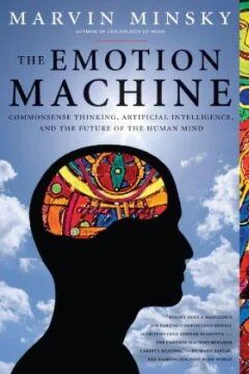
The further these activities spread, the more they will alter your Way to Think—and if your behavior then changes enough, then your friends might get the impression that you have turned into a different person.
Critic: That would be an exaggeration, because Charles will still be the very same person. He will still speak the same language and use the same knowledge; he’ll just have some different attitudes.
Of course, those cascades won’t change everything. When Charles adopts a new Way to Think , in many respects he’ll still be the same—because not all his resources will have been replaced. He still will be able to see and hear—but now he’ll perceive things in different ways. And because he now represents them in different ways, he’ll get different ideas about what those things or events might “mean.”
Charles will also still know how to talk—but may now use different styles of speech, and choose different subjects to talk about because, although he still has access to the same knowledge, skills, and memories, now different ones will be retrieved. He still may maintain the same plans and goals—but now they’ll have different priorities. He may still get dressed and go to work—but in some of those states he won’t dress so well. And so far as Charles, himself is concerned, he still has the same identity.
To what extent, then, will Charles be aware of such changes in his mental condition? He sometimes won’t notice those changes at all—but at other times, he may find himself making remarks to himself like, “I am getting angry now.” To do this, his brain must have ways to “reflect” on some of its recent activities (for example, by recognizing the spread of some large-scale cascades). Chapter §4 will discuss how such processes could lead to some aspects of what we call “consciousness.”
∞∞∞∞∞∞∞∞∞∞∞∞∞∞∞∞∞∞∞∞
What are dispositions and moods?
We all use many different words to vaguely describe how we feel and behave. We know that angry people more quickly react (but, usually, less cautiously) and that happy people less often start fights—but terms like these do not suggest ideas about how those states affect how we think. We recognize this when we deal with machines: Imagine that your car won’t start—but when you ask your mechanic for help, you only receive a reply like this:
“It appears that your car doesn’t want to run. Perhaps it’s become annoyed with you because you haven’t been treating it well.”
But psychological terms like these don’t help you to get good ideas to explain the behavior of your car. Perhaps you towed too heavy a load and broke some of the teeth of one of the gears. Or perhaps you left the lights on all night, and completely discharged the battery. Then those ‘mentalistic’ descriptions won’t help you; to diagnose and repair what’s wrong, you need to know about that car’s parts.
That’s where the view of a mind as a Cloud of Resources is better than the Single-Self view; it encourages us to look at the parts instead of the whole. Is there something wrong with the starter switch? Has the fuel tank been completely drained? Those commonsense psychology-words are useful in everyday social life, but to better understand our minds we need more ideas about their insides.
To what extents are emotions innate?It would seem that all normal person share some common emotions, such as anger, fear, sadness, joy, disgust, and surprise—and some would also include curiosity. However, psychologists do not broadly agree about which of these are innate and which are learned; for example, some of them regard anger as based on fear. This book will not get involved in that debate, because it is more concerned with what emotions are —in the sense of being ‘ways to think’—than with finding ways to classify them. [7] However, I recommend Aaron Sloman’s discussion of this in http://www.cs.bham.ac.uk/~axs/misc/talks/gatsby.slides.pdf.
How do Chemicals affect our Minds?
Physiologist: Your ideas about switching resources sound good, but can all mental states be explained in that way? Aren’t we also affected by chemicals like hormones, endorphins, and neurotransmitters?
There’s no doubt that such chemicals do affect the internal states of our brains—but the view that those effects are direct is a popular but bad mistake—somewhat like the error that someone would make by supposing that rain makes umbrellas unfold. Here’s how one author depicts what this misses:
Susanna Kaysen: “Too much acetylcholine, not enough serotonin, and you’ve got a depression. So, what’s left of mind? It’s a long way from not having enough serotonin to thinking the world is “stale, flat and unprofitable”; even further to writing a play about a man driven by that thought.” [8] In Girl, Interrupted, Vintage Books, 1994, pp. 137-143.
For just as the meaning of each separate word depends on the sentence that it is in, the effect of each chemical on the brain depends on all the particular ways in which each of your brain-cells react to it—each type of cell may differ in that. So the effect of each chemical will depend which brain-cells react to it—and then on how other cells in that happen to be connected to these, etc. So the large-scale effect of each chemical depends, not only on where and when it’s released, but also on the other details of the interconnections inside your brain. We’ll discuss more details in §§Chemicals.
How could machines understand what things mean?
In the popular view, machines do things without understanding what their activities mean. But what does ‘understanding’ mean? Even our best philosophers have failed to explain what we mean by words like “understand.” [9] Such an ‘all-or-none’ view of what ‘understand’ means can be seen at http://home.hanmir.com/~prolog/ai/mind.html or in “Minds, Brains, and Computers” by John Searle, in Philosophy: The Quest for Truth . Oxford Univ. Press; 5th edition, ISBN: 0195156242
However, we should not complain about that, because this is precisely the way it should be! For, most of our common psychology-words have this peculiar property: the more clearly you try to define them, the less you capture their commonsense meanings. And this applies especially to words like understand and mean !
If you ‘understand’ something in only one way then you scarcely understand it at all. For then, if anything should go wrong, you’ll have no other place to go. But if you represent something in multiple ways, then when one of them fails you can switch to another—until you find one that works for you.
It’s the same when you face a new kind of problem:
If you only know a single technique, then you’ll get stuck when that method fails. But if you have multiple ways to proceed, then whenever you get into trouble, you’ll be able to switch to a different technique.
We switch how we think so fluently that we scarcely aware that we’re doing this—except when this leads to cascades so great that we notice a change in emotional state. One of the central goals of this book is to describe the variety of our mental resources, and how these might be organized—and the final chapters of this book will show that much of our human resourcefulness depends upon on having multiple ways to escape from getting stuck.
Читать дальше













